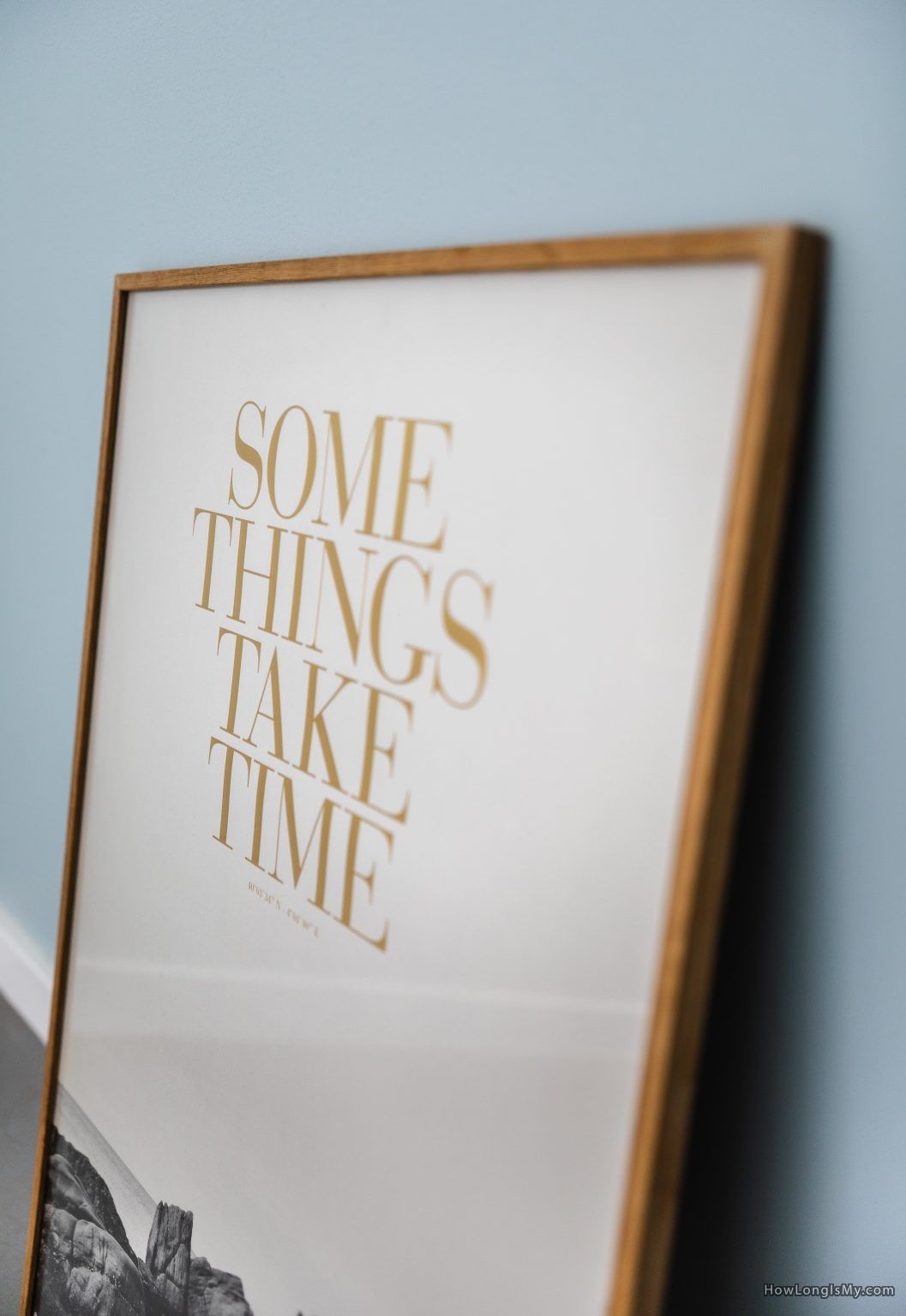The duration of patience is not fixed and can vary widely depending on the context and individual circumstances. Patience is the ability to tolerate delays, difficulties, or challenges without becoming frustrated or anxious.
How long someone can maintain their patience depends on factors
 Nature of the Situation – the more significant or complex the situation, the longer patience might be required. Waiting for a simple task to complete might require less patience than dealing with a long-term goal or a challenging problem.
Nature of the Situation – the more significant or complex the situation, the longer patience might be required. Waiting for a simple task to complete might require less patience than dealing with a long-term goal or a challenging problem.
Personal Tolerance – different individuals have varying levels of patience. Some people naturally have a higher threshold for waiting and uncertainty, while others might feel impatient more quickly.
Support and Coping Strategies – having a support system and effective coping strategies can help extend one’s patience. When people feel understood, supported, and have ways to manage their emotions, they tend to endure challenges more patiently.
Outcome Importance – The importance of the outcome can influence patience. If something is highly valuable or critical, people might be willing to wait longer.
External Factors – External circumstances, such as stress levels, workload, and personal commitments, can impact how patient someone can be.
Mindset and Attitude – A positive mindset and a focus on the bigger picture can contribute to maintaining patience. If someone understands the reasons for waiting and believes in the eventual positive outcome, they might be more patient.
Practice and Experience – Like any skill, patience can be developed and strengthened through practice. Over time, individuals might learn better ways to manage their emotions and maintain patience.
Patience is not an unlimited resource. Everyone has their limits, and there may come a point when patience wears thin. This is why effective stress management, relaxation techniques, and problem-solving skills can be beneficial in maintaining patience in challenging situations.
Ultimately, how long patience lasts depends on the individual’s unique characteristics, the situation they’re facing, and their ability to manage their emotions and stress.
What typically do people do when they run out of patience?
When people run out of patience, they might react in various ways depending on their emotions, personality, and the specific situation. Here are some common reactions that people might exhibit when they’ve reached the limit of their patience:
Express Frustration or Anger
 When patience runs thin, frustration and anger can surface. People might express their dissatisfaction, raise their voices, or even lash out verbally or physically.
When patience runs thin, frustration and anger can surface. People might express their dissatisfaction, raise their voices, or even lash out verbally or physically.
Impulsiveness
Impatience can lead to impulsive behavior. People might make hasty decisions without fully considering the consequences.
Withdrawal or Avoidance
Some individuals might withdraw from the situation or avoid the source of their impatience. This could involve walking away, giving up on a task, or avoiding interactions.
Complaining
People might engage in complaining or venting their frustrations to others. This could be in person, on social media, or through other means of communication.
Increased Stress
Running out of patience often leads to increased stress levels. This can manifest as physical tension, racing thoughts, and a general feeling of unease.
Loss of Focus
When patience is exhausted, it’s common to lose focus and concentration. This can affect productivity and decision-making abilities.
Negative Self-Talk
Impatience can lead to negative self-talk, where individuals berate themselves for not being able to handle the situation better.
Physical Symptoms
Intense impatience might manifest in physical symptoms like increased heart rate, shallow breathing, or headaches.
Disengagement
People might disengage emotionally from the situation, becoming detached and indifferent.
Risky Behavior
In extreme cases, impatience might lead to risky behavior as people seek immediate solutions to their frustrations.
All of these reactions are not universal and can vary widely based on the individual’s personality, coping mechanisms, and the context of the situation. In situations where patience is running thin, it’s helpful to consider strategies to manage emotions and stress. These might include taking deep breaths, stepping away from the situation temporarily, practicing mindfulness, using positive self-talk, or seeking support from others.
Mastering the Art of Patience: Strategies for Cultivating Inner Calm
 Developing emotional intelligence, communication skills, and stress management techniques can help individuals handle situations where patience is challenged and prevent the negative consequences of running out of patience.
Developing emotional intelligence, communication skills, and stress management techniques can help individuals handle situations where patience is challenged and prevent the negative consequences of running out of patience.
Developing better patience is a valuable skill that can enhance your well-being, relationships, and overall effectiveness in various areas of life. Here are some strategies you can practice to cultivate greater patience:
- Practice Mindfulness
Mindfulness involves being present in the moment without judgment. Engaging in mindfulness meditation can help you become more aware of your thoughts and emotions, allowing you to respond to situations with greater patience. - Set Realistic Expectations
Sometimes impatience arises from setting unrealistic expectations for how quickly things should happen. Practice setting more realistic timelines for yourself and others. - Practice Delayed Gratification
Engage in activities that require delayed gratification, such as saving for a larger goal or working on a long-term project. This can help build your ability to tolerate waiting. - Develop Empathy
Put yourself in others’ shoes and try to understand their perspective. This can help you be more patient when dealing with others’ actions or decisions. - Practice Deep Breathing
When you start feeling impatient, take slow, deep breaths. Deep breathing can help calm your nervous system and reduce feelings of frustration. - Practice Positive Self-Talk
Replace negative thoughts that contribute to impatience with more rational and positive ones. Remind yourself that things take time and that your impatience won’t necessarily speed things up. - Break Tasks into Smaller Steps
When working on a task that requires patience, break it into smaller, manageable steps. This can give you a sense of progress and help prevent impatience from building up. - Develop Flexibility
Be open to changes and unexpected delays. Flexibility can help you adapt to situations and reduce frustration when things don’t go as planned. - Practice Gratitude
Cultivate a habit of gratitude by focusing on the positive aspects of your situation. This can help shift your mindset away from impatience. - Learn to Tolerate Discomfort
Impatience often arises from discomfort with waiting or uncertainty. Practice tolerating discomfort in small ways to build your patience muscle. - Engage in Relaxation Techniques
Activities like yoga, progressive muscle relaxation, and visualization can help you manage stress and become more patient.  Set Personal Challenges
Set Personal Challenges
Challenge yourself to wait a bit longer before reacting to a situation that triggers impatience. Gradually increase the duration over time.- Practice Active Listening
When interacting with others, practice active listening to fully understand their perspective before responding. This can prevent impulsive reactions. - Reflect and Learn
After a situation where you struggled with patience, take time to reflect on what triggered your impatience and how you could handle it better next time.
Developing patience is a gradual process, and it’s okay to have setbacks. Patience is a skill that takes time to build, so be kind to yourself along the way. As you practice these strategies consistently, you’ll likely find that your ability to handle waiting, uncertainty, and challenges improves over time.
